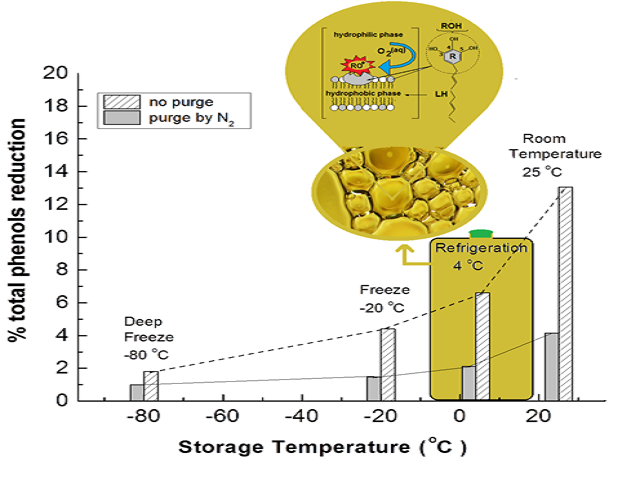Long-Term Preservation of Total Phenolic Content and Antioxidant Activity in Extra Virgin Olive Oil: A Physico-biochemical Approach
DOI:
https://doi.org/10.5530/fra.2020.1.2Keywords:
Freeze Stabilization, Natural Polyphenols, Free radicals, Lipid Peroxidation, Antioxidant activityAbstract
Objectives: This work, on low-cost controlled freeze methodology for stabilizing the phenolic content in Extra Virgin Olive Oil (EVOO), is evaluated by studying four Quality Indexes (QIs): free acidity, as % of oleic acid (1st-QI); UV-absorption values; K272, K232 and ΔK (2nd-QI); total phenolic content (TPC), as Gallic acid equivalence (3rd-QI); and lipid peroxidation products, as free malondialdehyde (MDA) (4th-QI). Methods: The study of QIs for EVOO under storage, absence of light, at 25, 4, -20 and -80°C, with or without N2-purge showed that the phenolic charge is stabilized for > 12 months, at refrigeration conditions storage (~ 4°C) in the absence of oxygen, whilst the peroxidation of lipids is being kept at a low level. Results: The results showed that the high concentration of natural hydroxylphenols in the EVOO in combination with its degassing (via N2-purge) and storage at ~ 4°C, constitute the optimum conditions for preservation of olive oil as a long-lasting EVOO (LL [legal limit]-EVOO) with high added value. Conclusion: The main scientific contribution of this study is: (i) development and evaluation of a methodology (freeze controlled treatment) for the long-term preservation of EVOO quality, (ii) understanding the physicochemical mechanism and factors determining EVOO quality and (iii) ready-to-use technology for the local and international market.
Downloads
Metrics





